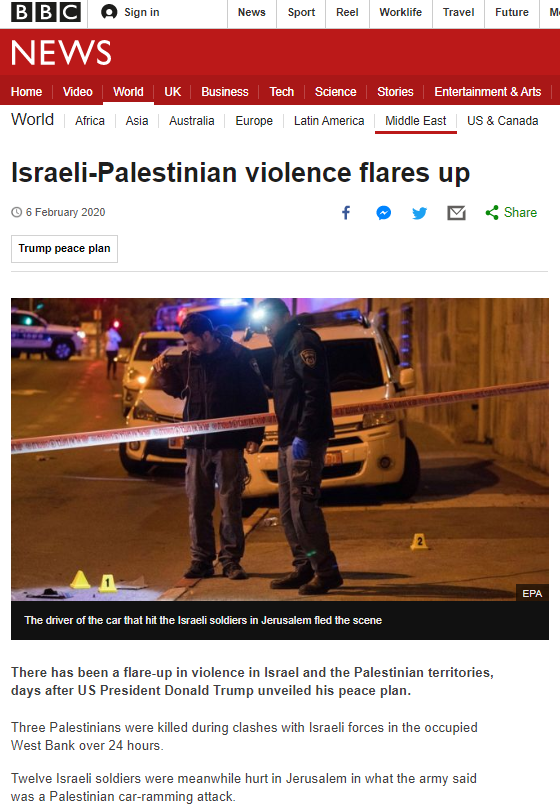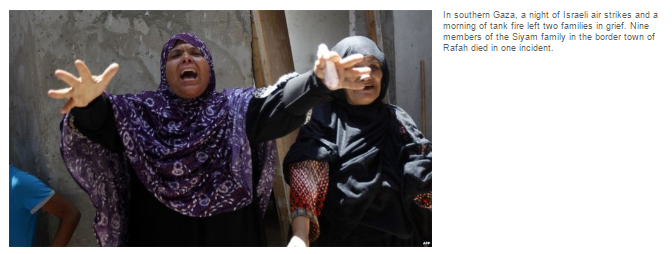On February 6th a report concerning the recent increase in terror attacks perpetrated by Palestinians appeared on the BBC News website’s ‘Middle East’ page under the headline “Israeli-Palestinian violence flares up”.
The false equivalence implied in that headline was repeated in the report’s opening lines.
“There has been a flare-up in violence in Israel and the Palestinian territories, days after US President Donald Trump unveiled his peace plan.”
In addition to failing to adequately clarify to audiences that the “flare-up” is the result of decisions made by Palestinians to engage in violence, the report uses frequently seen themes such as the negation of Palestinian agency and the portrayal of incidents using the superfluous “Israel says” formula.
The report portrays a number of incidents which took place on February 6th, the first of which was a vehicular attack on a group of Israeli soldiers in Jerusalem. Readers were told that: [emphasis added]
“Twelve Israeli soldiers were meanwhile hurt in Jerusalem in what the army said was a Palestinian car-ramming attack.”
“The first [attack] took place shortly before 02:00 local time (00:00 GMT) near the First Station entertainment venue in central Jerusalem.
The Israeli military said a “Palestinian rammed his car” into a group of soldiers who were marching along a pavement towards the Western Wall, one of Judaism’s holiest sites, for an induction ceremony.
One of the soldiers was seriously hurt and required surgery at the Shaare Zedek Medical Centre, while the others were lightly injured.”
The word ‘marching’ was added to the second version of the report with the original using the word ‘walked’. According to Israeli media the IDF spokesperson did not use the word marching as claimed by the BBC.
“IDF Spokesperson Hidai Zilberman said the troops were members of the Golani Brigade who were at the First Station during a “heritage tour” ahead of an early morning swearing-in ceremony at the Western Wall. […]
According to Zilberman, an initial investigation into the attack found that the soldiers were standing on the sidewalk next to the station when the car rammed them suddenly at high speed.”
The BBC’s report goes on to state that “The driver fled the scene and the car was later found abandoned near Beit Jala, a suburb of Bethlehem.”
Readers were not informed that:
“Small-scale clashes broke out in the village and the surrounding area as Israeli troops searched for the driver, who had fled the scene after hitting the soldiers.”
The second incident was described by the BBC as follows:
“Hours after the car-ramming attack, a man opened fire at several Israeli police officers stationed near Lion’s Gate in Jerusalem’s Old City, wounding one of them in the hand, a police spokesman said.”
As usual the BBC refrained from describing the incidents as terrorism in its own words and the only use of that term came in direct quotes from Israeli officials.
“”The terrorist himself was shot and neutralised at the scene,” he added. […]
Israeli Public Security Minister Gilad Erdan praised the officers for acting “quickly, determinedly and professionally” and said Israeli security forces would “act in any way possible to thwart the plans by the terror groups to escalate tensions”.”
The BBC report described the third incident thus:
“In the third attack, an Israeli soldier was lightly wounded in a drive-by near the Jewish settlement of Dolev, north-west of the West Bank city of Ramallah. The assailant fled the scene and a manhunt is continuing.”
What the BBC termed “a drive-by” was a shooting attack in which a soldier was wounded in the head.
The BBC report continued with a description of an incident in Jenin:
“Meanwhile, two Palestinians were killed in the northern West Bank town of Jenin early on Thursday.
Palestinian medics said Yazan Abu Tabikh, 19, was shot during clashes that erupted when Israeli troops demolished the home of a man convicted of involvement in the killing of a rabbi in 2018.
The Israeli military said its forces “identified a number of armed terrorists who hurled explosive devices and fired towards them”. […]
Hours later, Palestinian medics said a Palestinian police officer had also died after being hit by Israeli gunfire.
Palestinian security officials said Tareq Badwan, 25, was shot while inside the courtyard of a police station that was close to where the clashes occurred.
Israeli military spokesman Lt Col Jonathan Conricus said it was investigating Badwan’s death.
“The specific situation is unclear,” he told reporters. “Whether he fired at Israeli troops and then they retaliated and he was injured, or somebody else fired at Israeli troops and they retaliated and he was caught in the middle.””
Readers were not informed that Abu Tabikh was a Palestinian Authority police cadet.
An earlier incident was portrayed by the BBC thus:
“On Wednesday a 17-year-old Palestinian, Mohammed al-Haddad, was shot and killed by Israeli forces in the southern West Bank city of Hebron.
The Israeli military said that there had been a “violent riot”, during which “troops identified a Palestinian who hurled a Molotov cocktail at them”. “The troops responded with fire in order to remove the threat,” it added.”
At the end of the report readers found a brief mention of the rocket and mortar attacks from the Gaza Strip which the BBC has been ignoring since mid-January.
“Israeli warplanes also struck a number of Hamas positions in the Gaza Strip early on Thursday, including an underground complex and a maintenance facility, after mortars and balloons loaded with explosives were launched towards Israel, the Israeli military said. […]
On Wednesday, the military said 13 rockets had been fired from Gaza in a week.”
The BBC’s explanation for the surge in violent attacks is as follows:
“A spokesman for Palestinian Authority President Mahmoud Abbas warned that Mr Trump’s plan “caused such escalation and tension by trying to impose fake facts on the ground”.
“We have repeatedly warned that any deal that doesn’t answer the minimum of Palestinian rights and that doesn’t aim to make a just and lasting peace will definitely lead to the tension we are witnessing today,” Nabil Abu Rudeina said.”
The possibility that Palestinians could oppose the US proposal without resorting to violence does not appear to occur to the BBC, which went on to promote the view of a terrorist organisation it refrains from describing as such.
“The militant group Hamas, which controls Gaza, said: “The spreading resistance and clashes by our people in the West Bank and their resistance in the heart of occupied Jerusalem is an active response against the destructive Trump deal.””
BBC audiences were of course told nothing about the incitement to violence promoted by Fatah and the Palestinian Authority which is part of the backdrop to incidents such as those described in this report.




